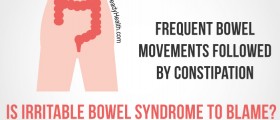
Causes of bowel diseases
Most visits to digestive tract specialists are caused by common bowel diseases such as irritable bowel syndrome, spastic colon, ulcerative colitis and Crohn's disease. Underlying cause of such diseases is still unknown but it is regarded that symptoms are made worse by excitement and stress. Diet also plays a role, as it is known that there are virtually no cases of Crohn's disease in lands where cuisine is based on unrefined grains and abundance of fruit and vegetables, while this type of disease is expanding rapidly in countries recently whose population lives on fast food, which includes much refined sugar and little vegetables and fiber.
Theories that try to explain cause of bowel diseases include problems with the immune system and food allergies. It was shown that condition of people who suffer from a bowel disease can improve once some troublesome foods have been omitted from the menu.
Crohn's disease
This disease alters natural flora of the intestines ("good", symbiotic bacteria and some other micro organisms that made alliance with our digestive tracts) and hamper assimilation of consumed nutrients (especially protein) and also causes deficiency in vitamins E and K, niacin, copper and zinc. Deficiency of magnesium, calcium, folic acid and vitamin C has also been recorded.
Consequences of bowel diseases
Typical symptoms of bowel diseases are spasms in the intestines, mucus, periods of either diarrhea or constipation, or both. This is painful and incapacitating; diarrhea attacks caused by irritable bowel syndrome are frequently too unpredictable for one to trust his ability to wander off from the nearest toilet.
Herbs for bowel diseases
It was noted that grapefruit seed extract helps to fight diarrhea, intestinal gas, constipation and bloating. Inflammation originating from bowel diseases causes pain that can be soothed with herbs such as liquorice, chamomile, peppermint, dandelion, calendula, and hops. These plants can also relax digestive muscles by affecting the nerves that control them, thus reducing the tension that may worsen bowel problems. Psyllium is typically used as a laxative, but it also helps in cases of diarrhea, constipation and soothing of pain.
Capsles with peppermint essential oil are widely used in Europe as an effective cure for irritable bowel syndrome. If you can't find them, try with peppermint tea, as it also helps. Yellow dock helps when there is bleeding in the intestines (like in cases of ulcerative colitis). It increases levels of iron in the organism and slows bleeding by toning of the intestinal lining.

















Your thoughts on this
Loading...